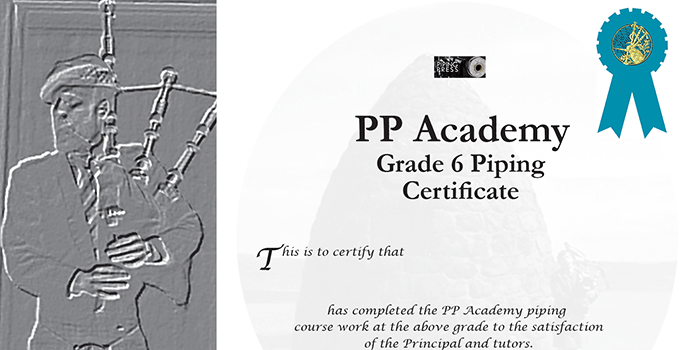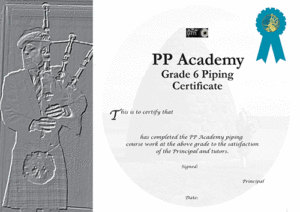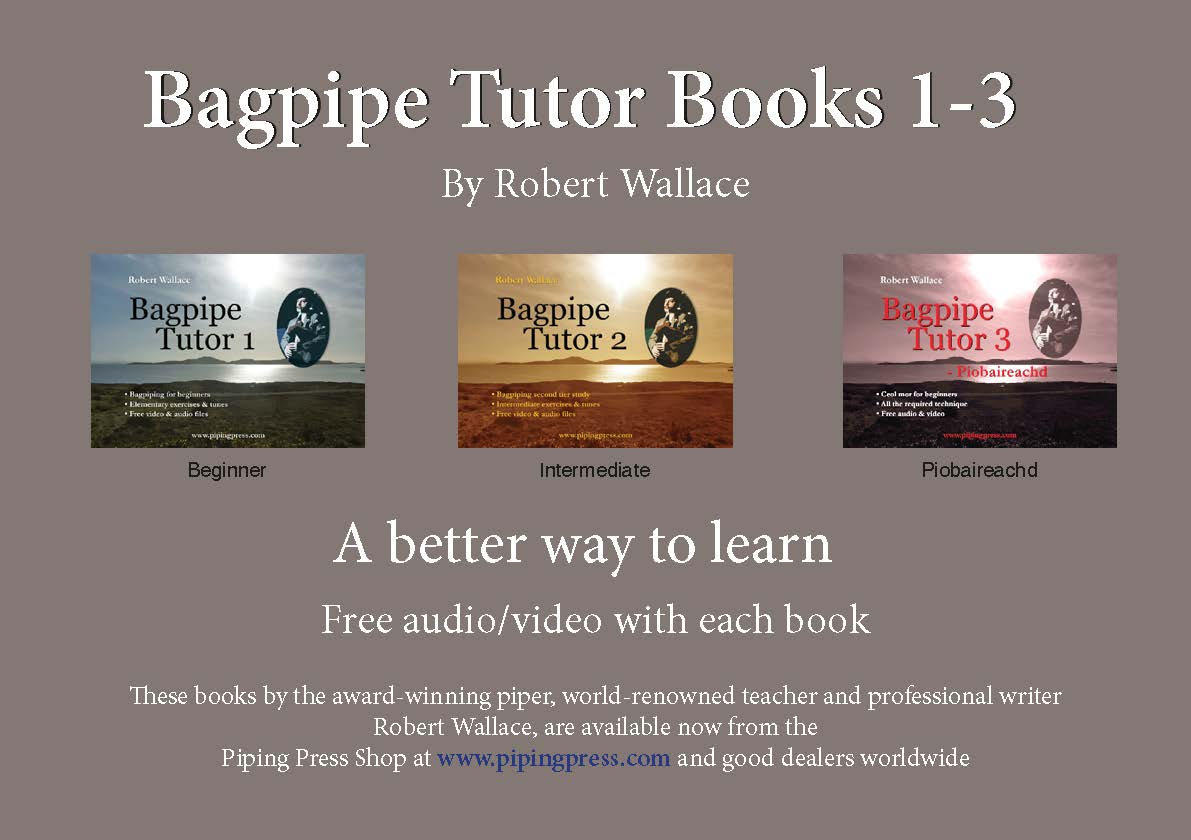Piping Press Academy exams place the emphasis firmly on the student’s practical performance ability, therefore only the theory which is necessary for the correct understanding, interpretation and performance of the music is expected. There are certificates for beginners, advanced beginners, piobaireachd and intermediate, advanced and graduate pipers.
The syllabus is based on Bagpipe Tutor Books 1, 2 and 3 by Robert Wallace – but not exclusively. Tunes performed should be from these books or be of similar levels of difficulty or above. These exams run in parallel with the curriculum covered in books 1, 2 & 3. They ensure that the student has some means of gauging progress in small increments. This notwithstanding, it is important that the required playing standard is achieved at each grade before progress can be made.
Accuracy of fingering is paramount. For certificate one the basic scale is either played correctly or it is not. Similarly, at all subsequent grades all the doublings, taorluaths and other movements must be played accurately. It is acceptable for them to be played a little on the slow side in the earlier grades but not so slowly that the rhythm of the movement is lost. The examiner will use his or her judgement on this.
The importance of establishing the correct finger positions and accuracy in playing the basic notes and movements cannot be over emphasised.
The examiner may ask a candidate to play any of the exercises or movements or tunes required for levels below that on which the candidate is being examined.
Theory and maintenance questions will be verbal. There is no written paper.
All examinations can be carried out in person or via the internet. A half hour assessment/ lesson is highly recommended before the exam proper is purchased.
These examinations have deliberately been kept at price which is affordable for all pipers, £25, the aim being to encourage as many as possible to improve their playing and set themselves achievable goals.
Book the half hour Skype/Facetime assessment / lesson here.
Buy your Skype/Facetime examination here.
Email pipingpress@gmail.com or barrypipes@msn.com to arrange to take the exam or to book a assessment / lesson in person.
Download a copy of the syllabus here: PP Academy Exam Syllabus
Students cannot be examined by their tutor.
At the successful conclusion of an examination the student will be forwarded, by email, a signed copy of their certificate at no extra charge:
PP ACADEMY EXAMINERS / INSTRUCTORS
Robert Wallace was for 15 years (1999 -2014) Principal of the now defunct College of Piping. He is respected worldwide as a bagpipe educator. He has won a great number of the top awards in piping. He is an RSPBA Assessor for the Piping & Drumming Qualifications Board. Robert is editor of Piping Press and Vice President of the Piobaireachd Society.
Barry Donaldson was a Director of the College of Piping for ten years and is a multiple winner of the World Pipe Band Championship with Strathclyde Police Pipe Band. In his competing days Barry excelled as a player of ceol beag winning many of the top awards. He is now a respected Adjudicator for the RSPBA and a qualified Assessor for the Piping & Drumming Qualifications Board. Barry has taught piping at schools in the UK throughout Europe and in North America.
It should be noted and appreciated that PP Academy exams are in-house exams and they bear no relevance at all to the system of exams run by the Piping and Drumming Qualifications Board. Anyone interested in sitting PDQB exams should contact either of the relevant exam centres.
PIPING CERTIFICATES (BEGINNER)
Novice Grade 1: This grade covers Lessons 1-5 inclusive from Bagpipe Tutor 1. It is intended to ensure that a student is making a correct start. Basic errors such as bent fingers, incorrect fingering of notes or persistent crossing noises must be avoided. The student will be expected to name the notes on the scale and finger accurately with emphasis on the exercises in Lessons 4 & 5 (G gracenotes).
Novice Grade 2: This certificate covers Lessons 1-9 inclusive in Bagpipe Tutor 1. G, D & E gracenotes and the D throw are the main additional playing techniques required. The student will be asked about hemping and drying the practice chanter and reed.
Novice Grade 3: This grade covers Lessons 1-11. Amazing Grace or an equivalent slow air must be played from memory on the practice chanter. Correct fingering and execution of all doublings (Lesson 11) will be expected.
Novice Grade 4: This certificate is for Lessons 1-13 and means the candidate will be able to play all doublings and the doublings exercise in Lesson 12 efficiently and at a reasonable tempo. The candidate will also be able to perform on the practice chanter High Road to Gairloch, or its equivalent, from memory.
Novice Grade 5: This grade covers Lessons 1-15. The birl and the third tune, Pulling Bracken or equivalent (must contain birls), are the main new skills expected for this certificate. The tune must be played from memory on the practice chanter and the birl and gracenote birl should be played from every note on the scale.
Novice Grade 6: The student will perform Amazing Grace or a slow air equivalent cleanly and with control on the bagpipe.
Novice Grade 7: The student will perform Amazing Grace and High Road to Gairloch or their equivalents on the bagpipe.
Novice Grade 8: This certificate covers Lessons 1-17 and the student will be expected to be thoroughly proficient in all technique and tunes to this stage and also to play from memory on the bagpipe the Green Hills of Tyrol or equivalent. The student may be asked to perform any exercise or tune from an earlier lesson.
Novice Grade 9: This certificate covers Lessons1-18 and the student will be expected to be thoroughly proficient in all technique and tunes to this stage and also to play from memory on the bagpipe Mhairi’s Wedding or equivalent. The student may be asked to perform any exercise or tune from an earlier lesson.
Novice Grade 10: This grade covers Lessons 1-20 from Bagpipe Tutor 1. Exercises from all lessons to be played on the practice chanter and all tunes on the pipes as requested by the examiner. The bagpipe should be reasonably well set though tuning assistance is permitted.
PIPING CERTIFICATES
Grade 1: This grade covers Lessons 1-4 from Bagpipe Tutor 2, Atholl Highlanders and Farquhar MacRae or their equivalents to be played on the pipes. The bagpipe should be reasonably well set, though tuning assistance is permitted. Questions concerning deportment and the setting of reeds will be asked. In addition to earlier tunes in Tutor 2, the student may also be tested on any tune from Bagpipe Tutor 1 or its equivalent.
Grade 2: This covers Lesson 5 & 6 in Bagpipe Tutor 2. The student will be able to play their first strathspey and reel competently on the bagpipe and answer theory questions regarding the rhythm and structure of this type of tune. In addition to earlier tunes in Bagpipe Tutor 2, the student may also be tested on any tune from Bagpipe Tutor 1 or its equivalent. The student will be asked about how to keep a bagpipe airtight and comfortable (drone cords distances, blowstick length, seasoning bag, hemping).
Grade 3: This covers Lesson 7 & 8 in Bagpipe Tutor 2. The student will be able to play their first hornpipe and jig competently on the bagpipe and answer theory questions regarding the rhythm and structure of these types of tune. In addition to earlier tunes in Tutor 2, the student may also be tested on any tune from Bagpipe Tutor 1 or its equivalent.
Grade 4: This covers Lessons 9-11 inclusive with questions asked on time signatures, on and off beats, a system of tuning, and bagpipe maintenance. The candidate will be expected to demonstrate steady blowing and a well maintained instrument whilst playing a slow air or other suitable tune.
Grade 5: This grade covers Lessons 1 to 13 in Bagpipe Tutor 2 and the student will be expected to play Miss Delicia Chisholm or similar four parted 2/4 march on the bagpipe, cleanly, accurately, with steady rhythm and tempo and good expression. In addition to earlier tunes in Tutor 2, the student may also be tested on any tune from Bagpipe Tutor 1 or its equivalent.
Grade 6: This grade covers Lessons 1 to 15 in Bagpipe Tutor 2 and the student will be expected to play Caledonian Canal or similar four-parted strathspey on the bagpipe, cleanly, accurately, with steady rhythm and tempo and good expression. In addition to earlier tunes in Tutor 2, the student may be tested on any tune from Bagpipe Tutor 1 or its equivalent.
Grade 7: This grade covers Lessons 1 to 17 in Bagpipe Tutor 2 and the student will be expected to play Thomson’s Dirk or similar four parted reel on the bagpipe, cleanly, accurately, with steady rhythm and tempo and good expression. In addition to earlier tunes in Tutor 2, the student may be tested on any tune from Bagpipe Tutor 1 or its equivalent.
Grade 8: This grade covers Lessons 1 to 20 in Bagpipe Tutor 2 and the student will be expected to play Jolly Beggarman and Paddy’s Leather Breeches or similar four-parted tunes on the bagpipe, cleanly, accurately, with steady rhythm and tempo and good expression. In addition to earlier tunes in Tutor 2, the student may be tested on any tune from Tutor 1 or its equivalent.
Grade 9: The candidate will be able to play all tunes and exercises from Tutors 1 & 2 or their equivalent plus one full Piobaireachd from Tutor 3 or equivalent on the bagpipe.
Grade 10: The candidate will be able to play all tunes and exercises from Tutors 1 & 2 or their equivalent plus two full Piobaireachd or parts thereof from Tutor 3 on the bagpipe.
PIPING CERTIFICATES (INTERMEDIATE & ADVANCED & GRADUATE)
Intermediate Certificate: The candidate will be able to play on the bagpipe two competition MSRs, two competition Hornpipes & Jigs and two piobaireachd containing taorluath and crunluath movements. Fingering will be accurate and all tunes will be played at a steady tempo for this level and with reasonable musical flow. The bagpipe must be tuned by the candidate to a good standard to the satisfaction of the examiner. Tunes, or parts thereof, selected by the examiner.
Advanced Certificate: The candidate will be able to play on the bagpipe four competition MSRs, four competition Hornpipes & Jigs and four piobaireachd containing taorluath and crunluath movements. Fingering will be accurate and all tunes will be played at an appropriate tempo for this level and with good musical flow. The bagpipe must be tuned by the candidate to a good standard to the satisfaction of the examiner. Tunes, or parts thereof, selected by the examiner.
Graduate Certificate: The candidate will be able to play on the bagpipe six competition MSRs, six competition Hornpipes & Jigs and six piobaireachd containing taorluath and crunluath movements. Fingering will be very accurate and all tunes will be played at a professional tempo for this level and with excellent musical flow. The bagpipe must be tuned by the candidate to a very good standard to the satisfaction of the examiner. Tunes, or parts thereof, selected by the examiner.
PIOBAIREACHD CERTIFICATES
Grade 1 Piobaireachd: This covers Lessons 1 & 2 in Bagpipe Tutor 3 or equivalent. Ability to finger the dre and edre accurately is paramount, and the ground and ground doubling of the Wee Spree, or similar, should be played on the practice chanter from memory.
Grade 2 Piobaireachd: This covers Lessons 1-4 in Bagpipe Tutor 3 or equivalent. Ability to finger the crunluath accurately and at reasonable speed is fundamental to gaining this award. The suibhal and triplet of the Wee Spree, or similar, to be played on the practice chanter from memory.
Grade 3 Piobaireachd: Lessons 1-5 from Bagpipe Tutor 3 or equivalent. Finger accurately the crunluath variation of the Wee Spree, or similar, on the practice chanter and play the whole tune competently from memory on the bagpipe. The bagpipe should be fairly well set. Candidates may be questioned or asked to play on the practice chanter, excerpts from Lessons 1–5.
Grade 4 Piobaireachd: Lessons 1-7 from Bagpipe Tutor 3 or equivalent. Students may be asked about the phrase patterns of the Wee Spree and Clan Campbell’s Gathering, or similar. They may be asked to demonstrate any fingering technique from Lessons 1-7. On the practice chanter the successful candidate will play from memory the urlar, urlar doubling and Variation 1 of Clan Campbell’s Gathering, or similar. On the bagpipe the candidate will play the Wee Spree, or similar, in full.
Grade 5 Piobaireachd: Lessons 1-9 from Bagpipe Tutor 3 or equivalent. Students may be asked about the phrase patterns of the Wee Spree and Clan Campbell’s Gathering. They may be asked to demonstrate any fingering technique from Lessons 1-9. The successful candidate will play from memory the taorluath of Clan Campbell’s Gathering, or similar, on the practice chanter. They will play one full piobaireachd with taorluath and crunluath variations on the bagpipe.
Grade 6 Piobaireachd; Lessons 1-10 from Bagpipe Tutor 3 or equivalent. Students will play from memory the whole of Clan Campbell’s Gathering, or similar, accurately on a well set bagpipe. Students will be asked history questions from Lesson 10. Students may be asked questions, or asked to demonstrate movements or parts of the Wee Spree, , or similar, from earlier lessons.
Grade 7 Piobaireachd: Lessons 1-12 from Bagpipe Tutor 3 or equivalent. Students will play accurately on the practice chanter the hiharin and double echo movements. Students will be asked about rhythm in piobaireachd. Candidates will play from memory the ground of the Boat Tune, or similar, on the practice chanter. Students may be asked questions or asked to demonstrate movements or parts of tunes from earlier lessons. They will be prepared to play two full tunes on the bagpipe.
Grade 8 Piobaireachd: Lessons 1-15 from Bagpipe Tutor 3 or equivalent. Students will play accurately on the practice chanter the dithis, taorluath and crunluath variations from the Boat Tune, or similar. Students may be asked questions, or asked to demonstrate movements or parts of tunes, from earlier lessons. They will be prepared to play two full tunes, or parts thereof, on the bagpipe.
Grade 9 Piobaireachd: Lessons 1-16 from Bagpipe Tutor 3 or equivalent. Students will play accurately on a well set bagpipe the whole of the Boat Tune, or similar, from memory. Students will be asked questions on piobaireachd classification as per Lesson 16. Students may be asked questions, or asked to demonstrate movements or parts of tunes, from earlier lessons. They will be prepared to play two other full tunes, or parts thereof, on the bagpipe.
Grade 10 Piobaireachd: Lessons 1-18 from Bagpipe Tutor 3 or equivalent. Students will demonstrate the dare movement from every note on the scale. They will also play from memory the ground of Duncan MacRae of Kintail, or similar, on the practice chanter. Students will be asked basic canntaireachd questions as per Lesson 17. They will be prepared to play three other full tunes, or parts thereof, on the bagpipe.
Grade 11 Piobaireachd: Lessons 1-19 from Bagpipe Tutor 3 or equivalent. Candidates will play the whole of Duncan MacRae of Kintail’s Lament on a well-tuned bagpipe. They will also demonstrate, on the bagpipe, variations – in particular the taorluath and crunluath variations – from other tunes in Bagpipe Tutor Book 3. They will be prepared to play three other full tunes, or parts thereof, on the bagpipe.
Grade 12 Piobaireachd: Lessons 1-20 from Bagpipe Tutor Book 3 or equivalent. Candidates will be asked to play either the Wee Spree, Clan Campbell’s Gathering, the Boat Tune or Duncan MacRae of Kintail’s Lament, or parts thereof, on a well tuned bagpipe. Similar tunes acceptable. The candidate can be asked questions on canntaireachd, rhythm in piobaireachd, classification and history as contained in Bagpipe Tutor Book 3. They will be asked to demonstrate some or all piobaireachd finger movements on the practice chanter.



















Recent Comments